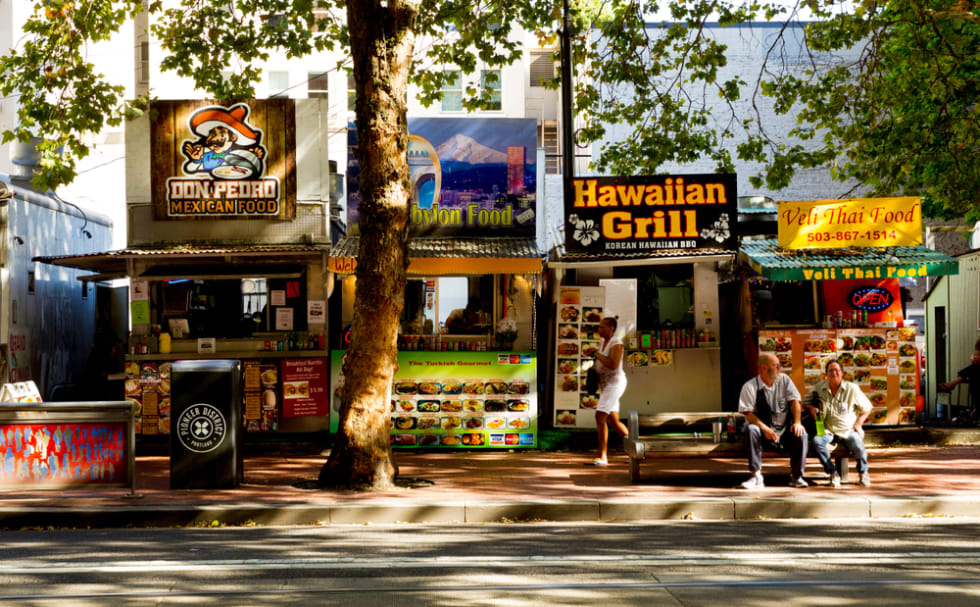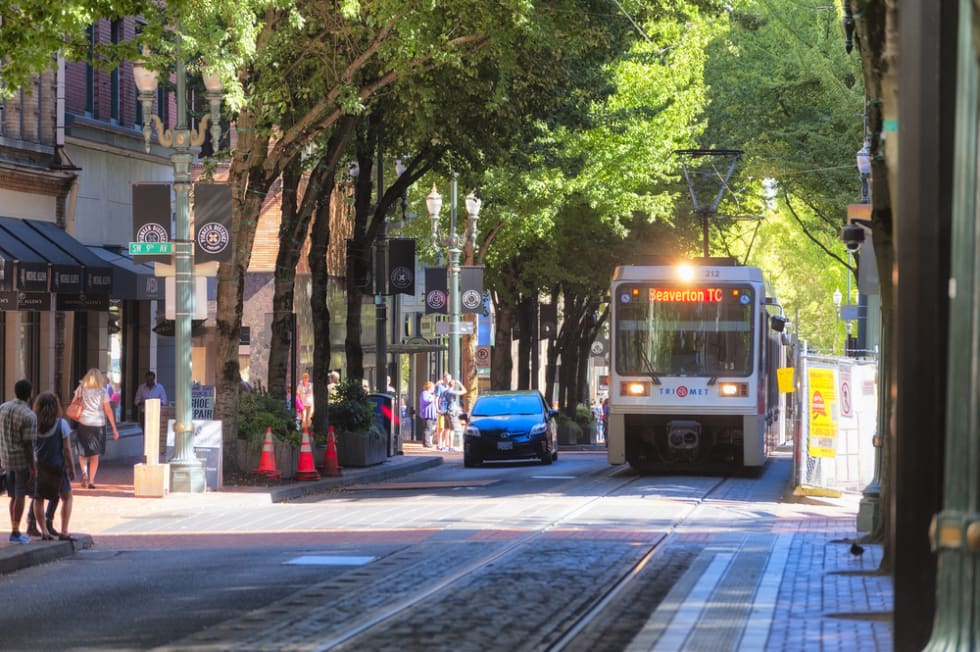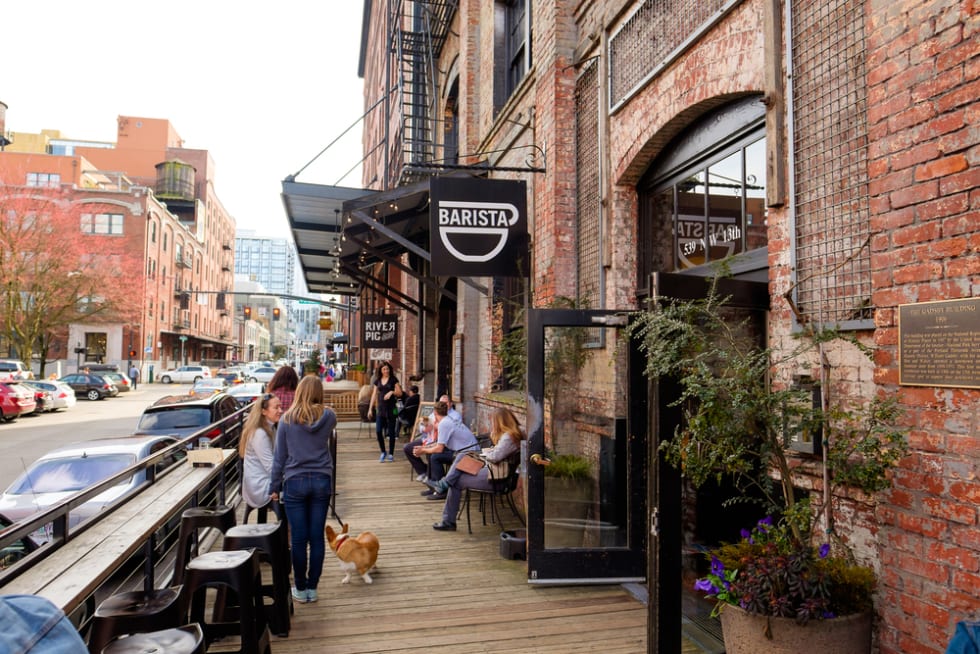Cost of Living in Portland, OR [2025]

Despite the notoriously grey and damp winters, Portland is a sparkling gem in the Northwest with a backdrop of the Columbia River and Willamette River. Portland was once known as a shipping center with proximity to the mountains and the Oregon coast but attracts newcomers looking for opportunity in the "Silicon Forest", healthcare scene, sustainable green jobs, or to pursue creative outlets.
The city's progressive culture, thriving food scene, and access to stunning outdoor activities make it an appealing option for renters. There's also good news for renters: while Portland's cost of living can be higher than some nearby areas, it still offers a relatively affordable alternative to cities like Seattle or San Francisco.
Today, living in Portland is incredibly popular for recent graduates and millennials looking for exceptional amenities, microbreweries, a hipster vibe, and a community that celebrates its quirkiness.
But how expensive is The City of Roses and how comfortably can you live there? Before you move, here's what to know about the cost of living in Portland, Oregon.
Cost of Living in Portland, OR
What Is the Cost of Living in Portland, OR?
If you're thinking of making the move to Portland, you can consider the cost of living data from Sperling's Best Places data. Currently, the cost of living in Portland, OR is 27.7% more expensive than the average U.S. city. It is also 11.7% higher than the Oregon average. Here's a look at how the different categories break down.
| Cost of Living | Portland | Oregon | U.S. |
|---|---|---|---|
| Overall | 127.7 | 114.3 | 100 |
| Grocery | 103.7 | 103.7 | 100 |
| Health | 101.4 | 94.6 | 100 |
| Housing | 184.1 | 150.2 | 100 |
| Median Home Cost | $537,200 | $468,400 | $338,100 |
| Utilities | 79.9 | 81 | 100 |
| Transportation | 107.1 | 107.1 | 100 |
| Miscellaneous | 140.1 | 108.2 | 100 |
Which Portland neighborhood you decide to live in will also make an impact on your cost of living. Settling in the middle of the action near microbreweries and bars will be more expensive than lying on the outskirts of the city. You can usually find cheaper rents in winter than at other times of the year, saving more money in your budget.

How Much Is Rent in Portland?
Currently, the overall median rent in Portland stands at $1,519, after falling 0.8% month-over-month and remaining flat. Prices remain down 0.8% year-over-year. For one-bedrooms, that median rate is $1,380, while two-bedrooms run closer to $1,636. Portland’s rent growth over the past year has is similar to both the state (0.6%) and national averages (-0.5%). If you live downtown near major amenities or in trendy areas like the Pearl District, expect to pay more.
How Much Is Rent in Portland, OR?
Currently, the overall median rent in Portland stands at $1,579, after rising 0.8% last month. Prices remain down 0.8% year-over-year. For one-bedrooms, that median rate is $1,435, while two-bedrooms run closer to $1,701.
| Bedrooms | Median Rent Price |
|---|---|
| Overall | $1,519 |
| 1-Bedrooms | $1,380 |
| 2-Bedrooms | $1,636 |
How Much is a 1-Bedroom Apartment in Portland, OR?
Apartment hunters looking for a one-bedroom apartment in Portland will pay a median rent of $1,380 per month. If you live downtown near major amenities or in trendy areas like the Pearl District, expect to pay more. We also looked over some of our latest rental data for the average rent prices in different Portland neighborhoods:
| Area | Rent |
|---|---|
| Overall | $1,380 |
| Downtown | $1,694 |
| Nob Hill | $2,090 |
| Pearl District | $1,928 |
How Much is a 2-Bedroom Apartment in San Antonio, TX?
Anyone looking for more space or who wants to save costs with a roommate can look to two-bedroom apartments in the San Antonio area. Here is what our data shows for some of the average rent prices in the area.
| Area | Rent |
|---|---|
| Overall | $1,380 |
| Downtown | $2,271 |
| Nob Hill | $3,265 |
| Pearl District | $3,111 |
How Much Is Housing in Portland?
If you're thinking about buying a place in Portland instead of renting, you'll find reasonable prices in comparison to areas like San Francisco. Currently, the median price of homes for sale is $537,200 in Portland, Oregon. You can compare that to the median home price in San Francisco of $889,499.
Learn more about the average rent prices in Portland.
What Salary Do You Need to Live in Portland, OR?
Portland enjoys a relatively stable job market with jobs in high-tech industries, manufacturing, athletic and outdoor apparel, and healthcare, among others. To find out how much you can afford in a city, use a budgeting rule that says you shouldn't spend more than 30% of your monthly income on rent. At a median rate of $1,380 for a one-bedroom, that means you need to earn at least $55,200 a year, $4,600 a month, or $28.31 per hour.
If you're trying to figure out how much you need to make by the hour, consider the living wage concept. The living wage is used to determine the minimum amount of money required to live above the poverty level.
According to MIT's living wage data, you'll need to earn at least $26.84 per hour if you're single with no children or $46.04 per hour for a family of four living in Portland. This figure covers just the basics. It won't cover expenses like eating out, going to the movies, or vacations. It also doesn't account for any savings, investments, or emergency expenses.
You can also consider the US Census Bureau data. It estimates that Portland's median household income during 2023 was approximately $88,792 a year, $7,399.33 a month or about $45.13 per hour. The average income makes Portland a comfortable place to live. It also attracts transplants from expensive tech capitals like San Francisco.
Fortunately, there are plenty of entrepreneurial and creative-minded spirits working around Portland. Working remotely at coffee shops is the norm, as is having side hustles to balance your income.
How Much Is Transportation in Portland?
Portland thrives on being a walkable, pedestrian-friendly, and bike-friendly city with a walk score of 67, a bike score of 83, and a transit score of 49.
The Portland Mass transit, TriMet, provides accessible bus, light rail, and commuter rail service across the metro area. Fares run $2.90 for a 2 1/2 hour ride on the light rail, or a $5.60 for a day pass.
Residents should expect to spend $8,544 per year for transportation for a single person and $14,332 for a family with two adults and two children. Thinking about a day trip? You can hop on Amtrak to travel north or south to areas like Corvallis and Eugene.
Although Portland is incredibly pedestrian and bike-friendly, you need a car to explore Mt. Hood or The Gorge areas. You can always rent a car for the day if you want to enjoy a car-free lifestyle.
Of course, gas is pricier than in many areas of the country. According to Numbeo, you'll spend at least $4.04 a gallon.
Keep in mind that it's illegal to pump your own gas throughout Oregon. Although tipping your gas attendant isn't mandatory, they still appreciate it. You might consider adding tips to your overall transportation expenses.

How Much Are Groceries in Portland?
MIT living wage estimates that single, full-time working adults should expect to spend around $4,895 on food annually if they cook their own meals and make their own snacks. However, residents celebrate Portland for its foodie reputation and endless restaurants and microbreweries to choose from. A family of four with two working adults and two children will spend $14,349 a year.
If you plan to take advantage of the food scene, you'll need to plan accordingly. Expect to spend $20 for a meal at an inexpensive restaurant. A three-course meal for two at a mid-range restaurant will cost $82.50.
Food trucks are popular around Portland, which can lower your expenses for an evening out. Prices may feel steep for a food truck or kiosk, but the city’s reputation for superb food makes up for it. Some of Portland’s most popular and celebrated food comes from food trucks.
How Much Is Child Care in Portland, OR?
Childcare is often one of the largest expenses for families, typically ranking just behind housing and rent. However, in Portland, OR, childcare costs are relatively more affordable compared to other regions. According to the latest data from MIT, a family of four with two working parents in Portland can expect to spend approximately $21,606 annually for one child and $38,532 for two children. By comparison, neighboring cities like Seattle might see costs as high as $22,220 for one child and $44,440 for two.
It's important to note that where you live in Portland can significantly influence child care prices. Neighborhoods facing a shortage of child care providers or long waitlists may have higher costs. On the other hand, there are ways to reduce expenses, such as exploring nanny shares, part-time preschool options, after-school care, or negotiating a flexible work schedule to accommodate part-time care.
How Much Is Healthcare in Portland?
MIT collected research and data from the Bureau of Labor Statistics and the Agency for Healthcare Research and Quality offer estimated healthcare costs for Portland locals. As a single, full-time working adult, you'll spend $2,676 per year on medical expenses. A family of three should expect to pay $10,555 per year.
How Much Are Utilities in Portland?
Essential utilities for electricity, heating, cooling, water, and garbage for a 915 sq. ft. apartment costs an average of $220.80 a month, which is a bit higher than the U.S. average of $207.16.
You also need to consider adding on extras, like a basic phone plan and Internet (60 Mbps or More, Unlimited Data, Cable/ADSL). According to Numbeo's latest data, you'll spend an extra $132.02, bringing up your utility bill to $352.82 per month.
Portland enjoys temperate weather with little snow and summers that aren’t scorching hot. You won’t need much to cool down your apartment. However, it’s damp and chilly during winter. Plan to layer with wool and budget for extra utility costs.

Portland, OR Fitness & Entertainment
Portland residents enjoy fresh air, biking, walking, and spending time outdoors. If you want to upgrade your fitness game, you'll pay another $38.77 for monthly membership fees. If you enjoy going to the movies, you'll pay $13 per seat.
Moving to Portland to take advantage of the entertainment and culture requires a bigger budget for entertainment. A visit to the Portland Art Museum, the Portland Opera, or Portland Center for Performing Arts will all require a bigger budget.
There's good news for frugal locals. You can reduce your costs around Portland by focusing on some of the free attractions and activities around the metro area. Biking is always a popular option, with open trails along the Springwater Corridor that stretch from Portland to Boring, Oregon. The International Rose Test Gardens features rose hybrids with incredible views of both Portland and Mt. Hood.
People watching and browsing are also popular at Powell's Books, the nation's largest independent bookstore. The seasonal Saturday Market is a great place to find international foods, samples, free music, and busker entertainment.

How Much Are Taxes in Portland, OR?
There are other expenses to consider when living in Portland. The state of Oregon has no sales tax, making purchases a bargain compared to major cities like San Francisco and Seattle.
The lack of sales tax can feel like a big win. However, Oregon's income taxes range from 5% to 9.9%, depending on how much you earn. Capital gains in the state are also taxed at the local state income tax rate.

Looking for an Apartment in Portland, OR?
Portland's reasonable cost of big city living, stunning backdrop, and unique vibe make it an easy choice if you're dreaming of relocating to the Pacific Northwest. If Portland seems too pricey for you, consider the cheapest places to live in Oregon!
Are you ready to pack up and see Portland for yourself? Explore which neighborhoodmight work best for your lifestyle. Register with Apartment List and begin apartment hunting in Portland, Oregon today!
FAQs: What to Know About the Cost of Living in Portland 2025
What is the cheapest rent in Portland, OR?
The cheapest rent you'll find in Portland is for a one-bedroom apartment. The median rent for a one-bedroom apartment in Portland is $1,380 per month. A two-bedroom apartment is more expensive at $1,636 a month.
What is the most expensive rent in Portland?, OR
The most expensive apartment in Portland is a two-bedroom apartment. The median rent for a two-bedroom apartment in Portland is $1,636 a month.
How expensive is it to live in Portland, OR?
Portland, Oregon's cost of living is higher than the rest of the state, but is still relatively affordable when compared to San Francisco or Los Angeles. A one-bedroom apartment in Portland is $1,380 per month. A single adult will also spend an average of $4,895 on food, $2,464 on medical, and $8,544 on transportation costs each year.
What is the population of Portland, OR?
The population of Portland was 630,498 in 2023. It is the largest most populated city in the state of Oregon. The population of the entire state of Oregon was 4,233,358 during the same time period.
What is a good salary in Portland, OR?
You can use the 30% rule which stipulates you spend no more than 30% of your salary on rent. If you rent a one-bedroom apartment in Portland for $1,380 a month, you should earn a salary of at least $55,200 a year, $4,600 per month, or about $28.31 an hour. You can also consider MIT's data that shows the living wage in Portland, OR is $26.84 per hour. This figure is the basic wage you need for housing, food, transportation and other essentials but won't cover any extra expensess, including student debt repayments. It's also a good idea to consider the U.S. Census Bureau, which shows the median household income in Portland is $88,792 a year.
Share this Article





